大学体验英语第4册教案
- 格式:doc
- 大小:223.00 KB
- 文档页数:91
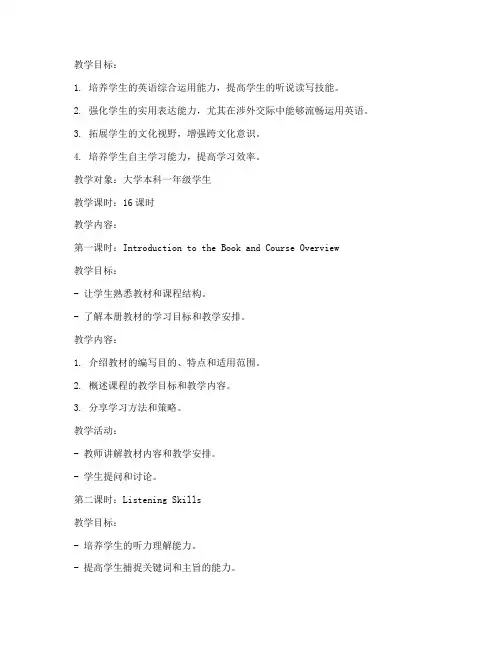
1. 培养学生的英语综合运用能力,提高学生的听说读写技能。
2. 强化学生的实用表达能力,尤其在涉外交际中能够流畅运用英语。
3. 拓展学生的文化视野,增强跨文化意识。
4. 培养学生自主学习能力,提高学习效率。
教学对象:大学本科一年级学生教学课时:16课时教学内容:第一课时:Introduction to the Book and Course Overview教学目标:- 让学生熟悉教材和课程结构。
- 了解本册教材的学习目标和教学安排。
教学内容:1. 介绍教材的编写目的、特点和适用范围。
2. 概述课程的教学目标和教学内容。
3. 分享学习方法和策略。
教学活动:- 教师讲解教材内容和教学安排。
- 学生提问和讨论。
第二课时:Listening Skills教学目标:- 培养学生的听力理解能力。
- 提高学生捕捉关键词和主旨的能力。
1. 听力技巧介绍。
2. 基本听力练习。
教学活动:- 教师播放听力材料,学生听后回答问题。
- 学生分组讨论听力技巧。
第三课时:Speaking Skills教学目标:- 培养学生的口语表达能力。
- 提高学生在真实场景中的交流能力。
教学内容:1. 口语表达技巧介绍。
2. 基本口语练习。
教学活动:- 学生进行角色扮演,模拟真实场景进行对话。
- 教师点评和指导。
第四课时:Reading Skills教学目标:- 培养学生的阅读理解能力。
- 提高学生快速捕捉信息的能力。
教学内容:1. 阅读技巧介绍。
2. 基本阅读练习。
- 学生阅读文章,回答问题。
- 教师点评和指导。
第五课时:Writing Skills教学目标:- 培养学生的写作能力。
- 提高学生撰写各类文章的能力。
教学内容:1. 写作技巧介绍。
2. 基本写作练习。
教学活动:- 学生进行写作练习,教师点评和指导。
第六课时:Grammar Review教学目标:- 巩固和复习语法知识。
- 提高学生在实际应用中的语法运用能力。
教学内容:1. 语法知识回顾。
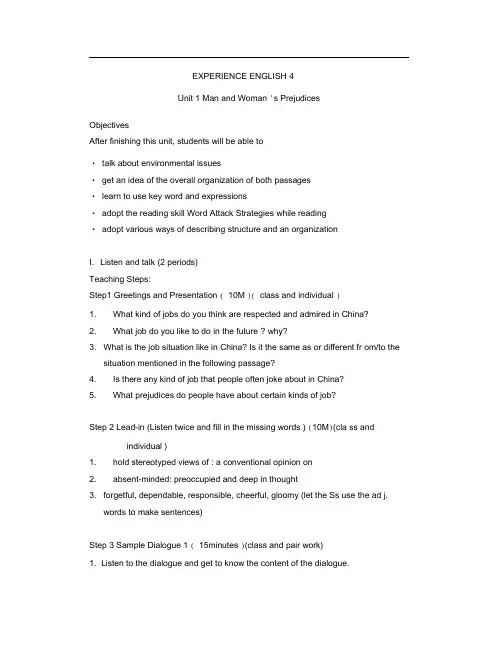
EXPERIENCE ENGLISH 4Unit 1 Man and Woman 's PrejudicesObjectivesAfter finishing this unit, students will be able to• talk about environmental issues• get an idea of the overall organization of both passages• learn to use key word and expressions• adopt the reading skill Word Attack Strategies while reading• adopt various ways of describing structure and an organizationI. Listen and talk (2 periods)Teaching Steps:Step1 Greetings and Presentation ( 10M )( class and individual )1. What kind of jobs do you think are respected and admired in China?2. What job do you like to do in the future ? why?3. What is the job situation like in China? Is it the same as or different fr om/to thesituation mentioned in the following passage?4. Is there any kind of job that people often joke about in China?5. What prejudices do people have about certain kinds of job?Step 2 Lead-in (Listen twice and fill in the missing words ) (10M)(cla ss and individual )1. hold stereotyped views of : a conventional opinion on2. absent-minded: preoccupied and deep in thought3. forgetful, dependable, responsible, cheerful, gloomy (let the Ss use the ad j.words to make sentences)Step 3 Sample Dialogue 1 ( 15minutes )(class and pair work)1. Listen to the dialogue and get to know the content of the dialogue.Question: Andrews is a man or a woman? Is he or she a secretary? What i s sheor he?2. Read and follow the tape and explain some of the language points1) circular letter: a letter of notice or notification2) outdated: old- fashioned, out-moded, eg. an outdated building3) prejudice: n.成见 , 偏见 损害, 伤害 歧视eg. a. He has a prejudice against all foreigners.b. I will do nothing to the prejudice of my friend in this matter.c. It must be understood that this concession is made without prejudice to anyfuture decision of the committee.vt. 使抱偏见 , 使怀成见 ; 伤害, 损害 , 不利于be prejudiced against [in favour of] a personThese facts prejudiced them against her.a prejudice against [in favour of]Useful expressions:prejudice sb.in favour 4) bring up: v.教育,培养,提出,(军队等)调上来,(船)抵达目的地 bring up 教育;养育 提出;引出to bring up the question 提出问题He was brought up short. 他突然停了下来。
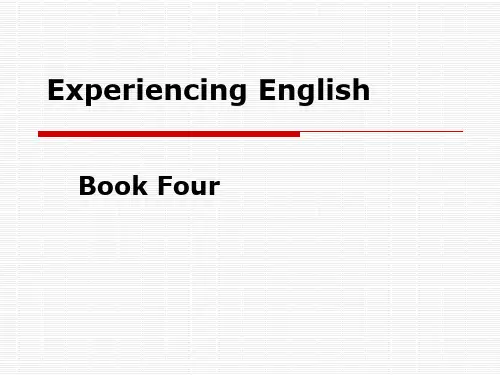


Unit One Men and Women's Prejudices1.Teaching Objectives:In This unit,the students will:·listen and then talk about job prejudice·read about men's roles at home·learn new words and expressions·write about the differences between men and women·practice reading skills: Recognizing generalizations·practice translating skills:Multiples·practice describing structures of an organization·write a job advertisement·visit culture salon for a discussion on computers and the changes in women's employment2.Main contents and hours distribution:1)Lead in:Listen and Talk / 1 period2)Read and Explore (passage A and B)/ 3 periods or more3)Write and Produce / 1 period4)Oral activities / 1 period5)Culture Salon / off class3.Main focus and points:1)Speaking:talk about prejudices against certain kinds of jobs,such as lawyers,nurses,teachers and so on.2)Words and expressions:to put forward a phenomenon and illustrate it from differentaspects,such as,criticize, mirror,trend,be bombarded by,syndrome, imply,call for, widespread agreement,obsolete,acknowledge, strive,recognition etc。
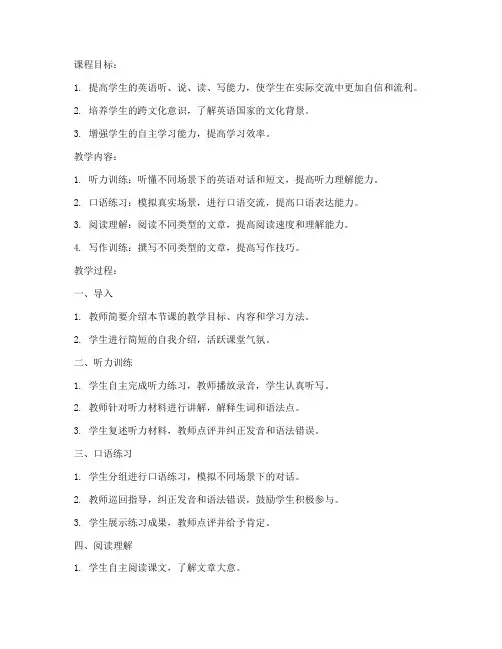
课程目标:1. 提高学生的英语听、说、读、写能力,使学生在实际交流中更加自信和流利。
2. 培养学生的跨文化意识,了解英语国家的文化背景。
3. 增强学生的自主学习能力,提高学习效率。
教学内容:1. 听力训练:听懂不同场景下的英语对话和短文,提高听力理解能力。
2. 口语练习:模拟真实场景,进行口语交流,提高口语表达能力。
3. 阅读理解:阅读不同类型的文章,提高阅读速度和理解能力。
4. 写作训练:撰写不同类型的文章,提高写作技巧。
教学过程:一、导入1. 教师简要介绍本节课的教学目标、内容和学习方法。
2. 学生进行简短的自我介绍,活跃课堂气氛。
二、听力训练1. 学生自主完成听力练习,教师播放录音,学生认真听写。
2. 教师针对听力材料进行讲解,解释生词和语法点。
3. 学生复述听力材料,教师点评并纠正发音和语法错误。
三、口语练习1. 学生分组进行口语练习,模拟不同场景下的对话。
2. 教师巡回指导,纠正发音和语法错误,鼓励学生积极参与。
3. 学生展示练习成果,教师点评并给予肯定。
四、阅读理解1. 学生自主阅读课文,了解文章大意。
2. 教师讲解文章中的生词和语法点,引导学生深入理解文章。
3. 学生回答问题,检验阅读效果。
五、写作训练1. 教师讲解写作技巧,指导学生撰写不同类型的文章。
2. 学生自主完成写作练习,教师点评并给予修改建议。
3. 学生展示写作成果,教师点评并总结写作技巧。
六、总结与作业1. 教师对本节课的教学内容进行总结,强调重点和难点。
2. 学生自主完成课后作业,巩固所学知识。
教学评价:1. 听力理解能力:通过听力练习和口语交流,评价学生在实际场景中的听力理解能力。
2. 口语表达能力:通过口语练习和写作练习,评价学生在实际交流中的口语表达能力。
3. 阅读理解能力:通过阅读练习和问题回答,评价学生在阅读理解方面的能力。
4. 写作能力:通过写作练习和作业完成情况,评价学生在写作技巧方面的掌握程度。
教学资源:1. 大学体验英语4教材及相关辅助材料。
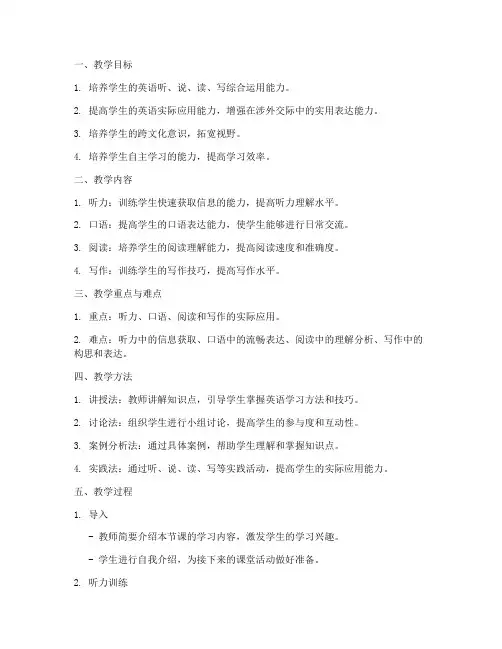
一、教学目标1. 培养学生的英语听、说、读、写综合运用能力。
2. 提高学生的英语实际应用能力,增强在涉外交际中的实用表达能力。
3. 培养学生的跨文化意识,拓宽视野。
4. 培养学生自主学习的能力,提高学习效率。
二、教学内容1. 听力:训练学生快速获取信息的能力,提高听力理解水平。
2. 口语:提高学生的口语表达能力,使学生能够进行日常交流。
3. 阅读:培养学生的阅读理解能力,提高阅读速度和准确度。
4. 写作:训练学生的写作技巧,提高写作水平。
三、教学重点与难点1. 重点:听力、口语、阅读和写作的实际应用。
2. 难点:听力中的信息获取、口语中的流畅表达、阅读中的理解分析、写作中的构思和表达。
四、教学方法1. 讲授法:教师讲解知识点,引导学生掌握英语学习方法和技巧。
2. 讨论法:组织学生进行小组讨论,提高学生的参与度和互动性。
3. 案例分析法:通过具体案例,帮助学生理解和掌握知识点。
4. 实践法:通过听、说、读、写等实践活动,提高学生的实际应用能力。
五、教学过程1. 导入- 教师简要介绍本节课的学习内容,激发学生的学习兴趣。
- 学生进行自我介绍,为接下来的课堂活动做好准备。
2. 听力训练- 学生听录音,完成听力练习题。
- 教师讲解听力技巧,指导学生提高听力水平。
3. 口语训练- 学生进行口语对话练习,提高口语表达能力。
- 教师点评学生的口语表现,提出改进意见。
4. 阅读训练- 学生阅读课文,完成阅读练习题。
- 教师讲解阅读技巧,指导学生提高阅读水平。
5. 写作训练- 学生根据教师提供的写作话题,完成写作练习。
- 教师点评学生的写作表现,提出改进意见。
6. 总结与反馈- 教师总结本节课的学习内容,强调重点和难点。
- 学生反馈学习过程中的疑问和困惑,教师解答。
7. 布置作业- 学生完成课后作业,巩固所学知识。
六、教学评价1. 课堂表现:学生的参与度、互动性、口语表达能力等。
2. 作业完成情况:学生的作业质量、完成度等。
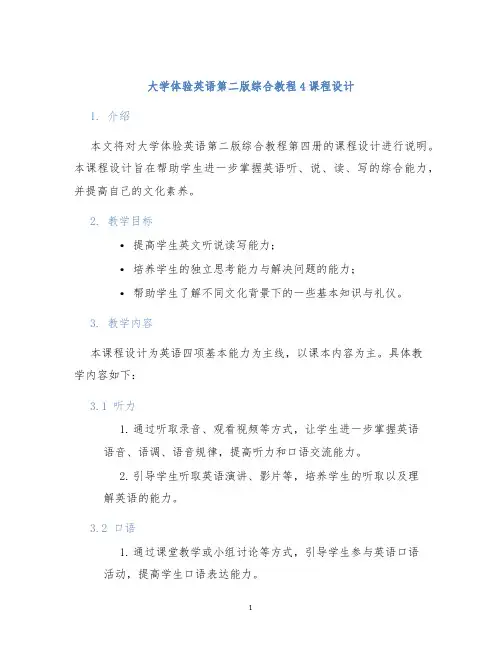
大学体验英语第二版综合教程4课程设计1. 介绍本文将对大学体验英语第二版综合教程第四册的课程设计进行说明。
本课程设计旨在帮助学生进一步掌握英语听、说、读、写的综合能力,并提高自己的文化素养。
2. 教学目标•提高学生英文听说读写能力;•培养学生的独立思考能力与解决问题的能力;•帮助学生了解不同文化背景下的一些基本知识与礼仪。
3. 教学内容本课程设计为英语四项基本能力为主线,以课本内容为主。
具体教学内容如下:3.1 听力1.通过听取录音、观看视频等方式,让学生进一步掌握英语语音、语调、语音规律,提高听力和口语交流能力。
2.引导学生听取英语演讲、影片等,培养学生的听取以及理解英语的能力。
3.2 口语1.通过课堂教学或小组讨论等方式,引导学生参与英语口语活动,提高学生口语表达能力。
2.增加课堂时间,培养学生的发音能力和口语表达流畅度。
3.3 阅读1.通过课外阅读,提高学生的阅读理解能力和词汇量;2.学习一些基本的阅读技巧,例如查字典、找关键词、提炼重点等,以帮助学生提高阅读效率。
3.4 写作1.通过激发学生的写作兴趣,引导学生写作,让学生体验写作乐趣。
2.通过课堂组织、习题安排等方式,让学生在语言、语法、表达方面提高。
3.5 文化背景理解和掌握1.让学生了解更多不同文化的基本生活知识,并学习不同文化海外交流的礼仪规则。
2.通过阅读或听取故事、观看视频等方式学习,了解不同文化的生活及背景等。
4. 教学方法在培养学生的英语综合能力上,本课程采用任务型教学方法,充分体现教师和学生的合作。
具体教学方法主要有:1.以启发式教育为出发点,激发学生学习兴趣,提高学生的自主学习能力。
2.以亲身体验为基础,通过设置文化背景、任务和实践环节,促进学生对英语的深刻理解和运用。
3.采用小组讨论、讲解和分享等方法,培养学生的读写能力和阅读理解能力。
4.启发学生的学习热情,鼓励学生多阅读以及语言、文字的艺术魅力,促使英语他们能够与中国传统文化交相辉映。

Unit 4 Language and EconomyObjectivesAfter finishing this unit, students will be able to● talk about our languages and the popularity of English● get an idea of the overall organization of both passages● learn to use key word and expressions● adopt the reading skill Identifying Tone while reading● learn to describe sizes and shapesListen and talk (2 periods)Teaching Steps:Step 1 Greetings and Presentation (10M)(class and individual)1.Do you think English is very important?2.Why do you choose English as your major?Step 2 Lead-in (Listen twice and fill in the missing words, then check S s’ answers ) (10M)(class and individual )1. How important it is in Yi Ling’s opinion?2. What type of career is Yi Ling thinking of?Step 3 Sample Dialogue 1 (15minutes)(class and pair work)1. Listen to the dialogue and get to know the content of the dialogue.2. Listen to the tape once again and answer the questions3. Read and follow the tape and explain some of the language points aspiration: ambition.e.g. You have high aspiration!Step 4 Communicative task I (15M)(group work)1. Practise dialogue 1 in pairs (partners)2. Communicative tasksListen to the tape and then make a dialogue according to the language situation given by task 13. useful phrases and sentences1) unlimited access to knowledge2) all field of human life3) universal language on the Internet4. Work in groups (Row 1&2, Row 3&4, Row 5&6 )5. Ask 2 groups to come and act out their dialogueStep 5 Sample Dialogue 2 (15minutes)(class and pair work)1. Listen to the dialogue and get to know the content of the dialogue.2. Listen to the tape once again and answer the questions1) When do we need to use English?2) Where do we need to use English?3. Read and follow the tape and explain some of the language pointsstatistic: the amount of sth.Step 6 Communicative task II (15M)(group work)1. Practise dialogue 2 in pairs (partners)2. Communicative tasksListen to the tape and then make a dialogue according to the language situation g iven by task 23. useful phrases and sentencesChina’s fascinating culture, rich cultural heritageEnglish is widely used in…4. group work (Row 1&3, Row 2&4, Row 5(team 1&3))5. Ask 2 groups to come and act out their dialogueStep 7 AssignmentRead and practice the dialogues and make free dialogue in groups.Passage A A Stateless Language That Europe Must Embrace (2 periods)Step 1 Greetings and a brief revision ( 3-5M ) (pair work or group work)Ask one or two pairs(groups) to act out their own dialogue about cultureStep 2 Pre-reading (5M)(group discussion)1. Do you know the meaning of “ lingua franca”?2. Do you know how many people are learning English in China?3. Do you think English should be the lingua franca in Europe and even in rest of the world as well?Step 3 Skimming (10M)(individual and class work)Read passage A within 8 minutes and try to get the main idea of the passage. Reference keys: The European Union decides to adopt a multi-linguistic approach in its organizations, therefore requiring all of its documents to be translated into each of the official languages of the EU. While this is a costly, and somewhat inefficient system, it does allow the EU to present an image of linguistic equality, which is symbolic of wider equality between its member states.Step 4 Scanning (20M)(class work)Discuss in groups and divide the passage into parts and get the main idea of each part.Step 5 ReviewRetell the passage (5-8M)Step 6 Language focus1. acculturation n. 文化传入,文化适应accuracy n. precision or exactness, esp resulting from careful effort精确,准确(尤指用心的结果)2. adversary n. opponent in a contest; enemy对手;敌手aggressor n. person or enemy that attacks first, without being provoked侵略者;攻击者;侵略国3. alter v. become different; change in character, position, size, shape, etc.改变,更改(性质、位置、大小、形状等)4. ascribe v. consider sth. to be caused by , written by or belonging to sb/sth 归功于,归咎于5. bind v. hold (people or things) together; unite结合6. imbalance n. lack of balance or proportion; inequality不平衡,不均衡,失调7. imperialist a. 帝国主义的imply v. hint; suggest (sth) indirectly 暗示,含有…的意思ineffective a. not producing the required effects无效的8. inhibit v. hinder or prevent抑制,约束9. intercultural a. happening among different cultures不同文化间的10. intractable a. not easily controlled or dealt with; hard to manage 难控制的;难对付的;难处理的11. invalidate v. make sth invalid使无效或作废legislation n. action of making laws立法,法律lobby n. group of people who try to influence politicians, esp. to support or oppose proposed legislation游说议员的团体machinery n. machines in general [总称]机器,机械medium n. means by which sth is expressed or communicated媒体;方法;媒介;手段12. militaristic a. 军国主义的minority n. smaller number or part (esp. of people voting or of votes cast) 少数13. monolingual a. speaking or using one language仅用一种语言的14. monolithic a. 单块的,一体的15. multilingual a. speaking or using many languages 使用多种语言的16. multilingualism n. 多种语言主义17. multiplicity a. variety多样性18. nativisation n. 本土化19. norm n. standard or pattern that is typical (of a group,etc)标准,规范opposition n. state or action of opposing反对,敌对,相反20. opt v. choose 选择original n. the earliest form of sth (from which copies can be made)原物,原作21. ostensible a. apparent 表面的outdate v. make out of date使过时22. paradox n. statement that seems to be absurd or contradictory but is or may be true似是非而的论点,自相矛盾的话23. perpetuate v. cause sth to continue使永存,使不朽policy n. plan of action, statement of ideas, etc proposed or adopted by a g overnment, political party, business, etc.政策,方针24. pragmatic a. treating things in a sensible and realistic way; concerned with practical results实事求是的;实际的;注重实效的promote v. help the progress of (sth); encourage or support促进,鼓励25. raison d'etre n. (法)存在的理由(或目的)reliable a. consistently good in quality or performance, and so deserving tru st; dependable可信赖的,可靠的26. replay n. play again重放,重赛reveal v. make (facts, etc) known显露出来,揭露,泄露27. socio-linguist n. 社会语言学家stateless a. not recognized as belonging to any country无国籍的28. substance n. particular type of matter物质,实质,substantially ad. essentially大体上,基本上superior a. better than average优良的,上好的29. translatability n. 可译性30. uphold v. support (a decision, etc) against attack支持,赞成Step 7 AssignmentReview the textGeneral writing:Write a short passage of 120 words or so on the topic “The Imp ortance of Learning Spoken English.”Passage B Could “Japanglish” Be a Legitimate Language (2 periods) Step 1 Greetings and a brief revision ( 3-5M ) (pair work or group work) Dictation: some useful words, expressions and sentences.Step 2 Pre-reading (5M)(group discussion)1. Do you think Chinese English should be accept as a variety of English? Why or why not?2. What kind of English do you think Chinese English is?3. What can you predict about the passage from the title “Could Japanglish be a legitimate language?”Step 3 Skimming (10M)(individual and class work)Read passage A within 8 minutes and try to get the main idea of the passage. Reference answer: Despite the fact that English has been taught in Japan for many years, the standard of English in Japan is much lower than in many other countries, and it retains a strong Japanese flavor to its grammar, pronunciation and sentence structure. Do the exercise on page 88 and check the Ss’ comprehension.Step 4 Scanning (20M)(class work)Discuss in groups and divide the passage into parts and get the main idea of each part.Step 5 ReviewRetell the passage (5-8M)Step 6 Language focus1. blend n. mixture of different sorts混和,混合物,交融2. cautious a. (about/of) showing or having caution; careful谨慎的;小心的3. champion v. support; defend vigorously支持;维护4. claim (to/on)n. right to sth; assertion(对…的)权利;声称,断言5. column n. part of a newspaper regularly dealing with a particular subject or written by the same journalist(报纸的)专栏6. commerce n. trade (esp. between countries); buying and selling of goods商业,贸易7. comprehensible a. that can be understood fully能理解的8. condemn v. say that one disapproves of sb/sth谴责;责备9. congenial a. agreeable or pleasant because suited to one’s nature or tastes合意的,喜欢的10. converse v.11. talk谈话,交谈12. criticize v. point out the faults of sb/sth批评,批判13. currently ad. at the present time现在,当前14. debate v. discuss (sth)辩论,争论15.diplomacy n. management of relations between countries by each country’s representatives abroad; skill in this外交;外交手段16. disservice n. harmful or unhelpful action损害;危害;伤害17. doctorate n. highest university degree博士学位18. effective a. having an effect; producing the intended result有效的,生效的,起作用的19. erosion n. process of eroding or being eroded侵蚀;腐蚀20. exuberance n. state or quality of being exuberant茂盛;活跃21. fluency n. quality or condition of being fluent流利;通顺;22. gobbledygook n. difficult or pompous language use by specialists; jargon费解或浮夸的术语;行话23. hallmark n. distinctive feature, esp of excellence特点,特征24. infuriate v. make extremely angry激怒25. ingredient n. any of the foods that are combined to make a particular dish(烹调用的)材料,原料,成分26. retort v. make a quick, witty or angry reply, esp. to an accusation or challenge反驳,反击27. rudimentary a. elementary; (not more than) basic初步的;(充其量)基本的28. sheer a. complete; thorough; utter完全的;彻底的;十足的29. snobbery n. behavior, language, etc characteristic of a snob势利行为,势利话等30. spat n. small or unimportant quarrel小争吵31. subtitle n. words printed on a film that translate the dialogue of a foreignfilm, give those of a silent film or supply dialogue for deaf viewers字幕32. syntax n. 句法;语句结构33. vend v. offer (especially small articles) for sale出售Step 7 AssignmentReview the textPractical writing: Suppose you are a sophomore and want to apply for the job- a tutor to an English high school student advertised in the Evening Paper. Write an application letter in no less than 120 words.。

一、制定本教案相关信息:课程名称:大学英语听说课程类别:必修课授课方式:模仿+实践授课对象: 非英语专业本科生Non-English Major班型:30人/班授课教室:语音室或多媒体教室分级教学:A级和B级计划修读时间:第一-四学期学时/学分比:16:1教学计划:每学期1学分,共16学时,四个学期累计4学分,64学时使用教材:大学体验英语听说教程1-4册,李霄翔,高等教育出版社,2013,第三版;教学实施方案:从《大学体验英语听说教程》第一-四册每册15个单元中筛选出10个单元,共40个单元;从第一-三册每册筛选出的10个单元中再筛选出8个单元,从第四册筛选出的10个单元中筛选出6个单元,共30个单元课堂完成,其余10个单元由学生在课余时间自主完成;这10个单元中的听力项目纳入A级考试范围。
对B级不作要求。
A级(快班)和B级班(普通班)听说课教学安排如下:A级(快班):第一-三学期每学期课堂完成10个单元,每单元平均用时80分钟。
B级(普通班):第一-三学期每学期课堂完成8个单元,第四学期完成6个单元,每单元平均用时100分钟。
(一)第一单元 Unit 1教学单元Teaching Topic Unit1: Identity: I lived the life of Dane…学时分配TimeAllotmentA级Cl.A80分钟B级Cl.B100分钟Tips for teaching 除objectives 其他各单元可共用,或只保留在每册的第一单元1.Objectives: After learning this Unit, the students are expectedto be able to:Understand some simple dialogues related to identityTalk about their definition of identity and its demonstration in daily life2.be familiar with words and expressions about describing feeling, thought and memory, activities, people of a certain age,crime3.Four principles of teaching:Rich input: to develop students’ language abilityClear tasks: to guide students to focus on whatthey should rememberListening and speaking strategies: to help students becomemore fluent and confident in listening and speakingSelf-expression: to improve students’ overall oral ability by combining listening activities with speaking3. Basic learning approaches for students to practice:imitationinteractioncooperationStep2: Warm up: Definition of one’s identityWho are you? Find five words to describe your partner. What are the aspects that make up a person’s identity?6 1125 30 Step3: Listening Task: Describe the boy’s personality in eachof the picturespre-listening: new vocabulary and expressions explanation: words: introverted, short-tempered, lazy, outgoing, energetic, lively, shy, anxious, excitable, timidExpressions:Describe what kind of person…How much doyou identify yourself with…?What should you do to …?How do you feel…when…?listening to the CD for 3timespost-listening: finish the related exercises25 30 Step4: Interactive Practice:Lost passportPre-watching: new vocabulary and expressions explanationWords: Scottish, renew, inconvenient, safe, pull one’s legWhile-watching: watch Lost passport(1) for two times andfinish the related exercisesPost-watching: check their answers20 25 Step5: Interaction Link: My identity mapFree-talk: form a group. Choose three of the questions below.Walk around the room and get three answers for each question.Questions:Who are you?What will you be?What three words would you choose to best describe yourself?Why do those words accurately describe you?What kind of person do you like to talk with?What are the aspects that make up one’s identity?What three words do you want to use to describe yourself ten years from now?What three words does your partner want to use to describe you?What do you think of the three words used by your partner?2 2 Step6: SummarySum up the key words and expression in this unit.2 2 Step7: HomeworkAssign homework to students: watch the video again after classand play it.。
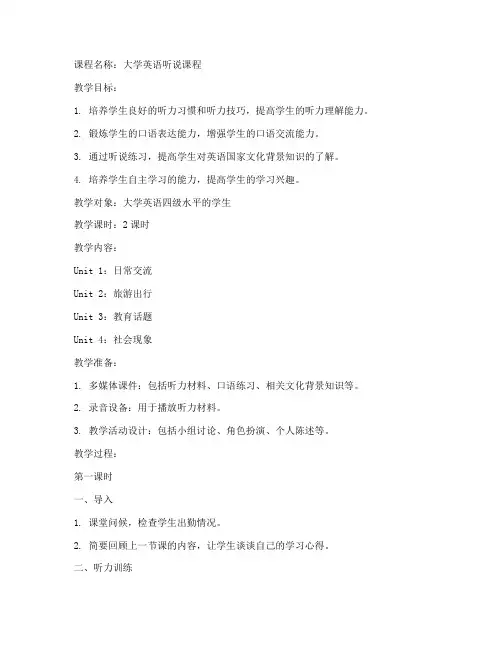
课程名称:大学英语听说课程教学目标:1. 培养学生良好的听力习惯和听力技巧,提高学生的听力理解能力。
2. 锻炼学生的口语表达能力,增强学生的口语交流能力。
3. 通过听说练习,提高学生对英语国家文化背景知识的了解。
4. 培养学生自主学习的能力,提高学生的学习兴趣。
教学对象:大学英语四级水平的学生教学课时:2课时教学内容:Unit 1:日常交流Unit 2:旅游出行Unit 3:教育话题Unit 4:社会现象教学准备:1. 多媒体课件:包括听力材料、口语练习、相关文化背景知识等。
2. 录音设备:用于播放听力材料。
3. 教学活动设计:包括小组讨论、角色扮演、个人陈述等。
教学过程:第一课时一、导入1. 课堂问候,检查学生出勤情况。
2. 简要回顾上一节课的内容,让学生谈谈自己的学习心得。
二、听力训练1. 播放Unit 1的听力材料,学生边听边做笔记。
2. 播放完毕后,引导学生回答以下问题:- What is the main topic of this conversation?- What are the key points discussed in the conversation?- How do the speakers express their opinions?三、口语练习1. 分组讨论:让学生根据听力材料中的话题,进行小组讨论。
2. 角色扮演:让学生扮演听力材料中的角色,进行口语练习。
四、课堂小结1. 教师总结本节课的重点内容。
2. 布置课后作业,让学生预习Unit 2。
第二课时一、复习1. 复习上一节课的内容,检查学生对听力材料的理解程度。
2. 引导学生回顾小组讨论和角色扮演的收获。
二、听力训练1. 播放Unit 2的听力材料,学生边听边做笔记。
2. 播放完毕后,引导学生回答以下问题:- What are the main topics discussed in this conversation?- How do the speakers express their opinions about travel?- What are the key points about travel mentioned in the conversation?三、口语练习1. 分组讨论:让学生根据听力材料中的话题,进行小组讨论。
教学对象:大学非英语专业学生教学目标:1. 培养学生良好的英语听说习惯,提高学生的英语口语表达能力。
2. 增强学生对英语国家文化背景知识的了解,提高跨文化交流能力。
3. 培养学生的逻辑思维能力和批判性思维能力。
教学内容:《大学体验英语听说教程4》共包含12个单元,每个单元包含听力材料、口语练习和拓展活动。
本教案以第6单元为例,具体教学内容如下:一、单元主题:Environmental Protection(环境保护)二、教学重点:1. 听力理解:理解英语国家人士在环境保护方面的观点和态度。
2. 口语表达:学会用英语表达对环境保护的看法和建议。
3. 拓展活动:了解我国环境保护的现状和挑战。
三、教学步骤:1. 导入(5分钟)- 教师简要介绍单元主题,激发学生的学习兴趣。
- 通过图片、视频等形式,展示英语国家在环境保护方面的成果和挑战。
2. 听力训练(20分钟)- 学生自主完成听力材料,教师指导学生注意关键词、短语和句子结构。
- 教师播放听力材料,学生跟读并回答问题。
3. 口语练习(20分钟)- 教师带领学生进行口语练习,包括角色扮演、小组讨论等。
- 鼓励学生用所学词汇和句型表达对环境保护的看法和建议。
4. 拓展活动(15分钟)- 学生查阅资料,了解我国环境保护的现状和挑战。
- 分组讨论,提出应对措施和建议。
5. 总结与反馈(10分钟)- 教师总结本节课的重点内容,强调环境保护的重要性。
- 学生分享自己的学习心得,教师给予点评和指导。
四、教学评价:1. 听力测试:考察学生对听力材料的理解程度。
2. 口语展示:评估学生的口语表达能力和交际能力。
3. 拓展活动成果:检查学生对环境保护现状的了解程度。
五、教学资源:1. 教材:《大学体验英语听说教程4》2. 课件:多媒体教学课件,包括图片、视频等素材3. 网络资源:环境保护相关网站、论坛等六、教学反思:1. 教师应关注学生的个体差异,因材施教,提高学生的学习兴趣。
教学目标:1. 学生能够听懂并理解关于饺子的英语对话。
2. 学生能够运用所学词汇和语法知识,进行简单的口语表达。
3. 学生能够阅读并理解关于饺子的英文文章,提高阅读理解能力。
教学重点:1. 词汇:dumpling,dough,filling,wrap,bite,etc.2. 语法:一般现在时和一般过去时的运用。
教学难点:1. 学生在听力和口语表达中,如何准确运用所学词汇和语法知识。
2. 学生在阅读中,如何理解文章的主旨和细节。
教学过程:一、导入(5分钟)1. 教师展示一张饺子的图片,引导学生用英语描述饺子。
2. 学生自由讨论饺子的制作过程和食用方法。
二、听力(15分钟)1. 教师播放关于饺子的英语对话,让学生初步了解对话内容。
2. 学生听后回答问题,如:饺子是什么?饺子皮和饺子馅分别是什么?3. 教师讲解对话中的生词和语法,如:dumpling,dough,filling,wrap,bite,etc.4. 学生跟读对话,模仿语音、语调。
三、口语(10分钟)1. 教师带领学生进行角色扮演,模拟制作和品尝饺子的场景。
2. 学生运用所学词汇和语法知识,进行简单的口语表达。
四、阅读(15分钟)1. 教师分发关于饺子的英文文章,让学生自主阅读。
2. 学生回答问题,如:文章讲述了什么内容?饺子在哪个国家很受欢迎?3. 教师讲解文章中的生词和语法,如:dumpling,dough,filling,wrap,bite,etc.4. 学生复述文章的主要内容。
五、总结与作业(5分钟)1. 教师总结本节课所学内容,强调重点和难点。
2. 布置作业:让学生用英语写一篇关于饺子的短文,介绍饺子的制作过程、食用方法和文化意义。
教学反思:1. 本节课通过听力、口语和阅读三个环节,让学生在轻松愉快的氛围中学习关于饺子的英语知识。
2. 教师应注重培养学生的口语表达能力,鼓励学生在课堂上大胆开口说英语。
3. 教师应关注学生的学习情况,及时调整教学策略,提高教学效果。
教学目标:1. 让学生了解泰坦尼克号的沉船事件,培养学生的阅读理解能力。
2. 培养学生对历史事件的兴趣,提高他们的文化素养。
3. 通过小组讨论,提高学生的口语表达能力和团队合作能力。
教学重点:1. 理解并掌握课文中的生词和短语。
2. 掌握阅读技巧,提高阅读速度和理解能力。
3. 学会运用所学知识进行口语表达。
教学难点:1. 理解并分析课文中复杂的历史背景。
2. 将所学知识运用到实际生活中。
教学准备:1. 课文原文、PPT、多媒体设备。
2. 小组讨论表格、课堂活动记录表。
教学过程:一、导入1. 利用PPT展示泰坦尼克号的图片,引导学生了解泰坦尼克号的相关信息。
2. 提问:你们知道泰坦尼克号的故事吗?它的沉船事件给我们带来了哪些启示?二、阅读课文1. 学生阅读课文,了解泰坦尼克号的沉船事件。
2. 教师引导学生找出课文中的生词和短语,进行讲解。
3. 学生再次阅读课文,加深对课文的理解。
三、小组讨论1. 将学生分成若干小组,每组讨论以下问题:a. 泰坦尼克号的沉船事件给我们带来了哪些教训?b. 如何避免类似事件再次发生?c. 泰坦尼克号的故事对现代社会有什么启示?2. 各小组派代表分享讨论成果。
四、课堂活动1. 教师展示一些与泰坦尼克号相关的图片和视频,让学生回忆课文内容。
2. 学生分组进行角色扮演,模拟泰坦尼克号上的场景,如乘客、船员、救援人员等。
3. 学生通过角色扮演,运用所学知识进行口语表达。
五、总结与作业1. 教师总结本节课的重点内容,强调阅读技巧和口语表达能力的重要性。
2. 布置作业:a. 复习课文,掌握生词和短语。
b. 搜集有关泰坦尼克号的历史资料,撰写一篇短文。
c. 与家人或朋友分享本节课的学习心得。
教学反思:本节课通过阅读、讨论、角色扮演等多种教学方式,让学生深入了解泰坦尼克号的沉船事件,提高他们的阅读理解能力和口语表达能力。
在今后的教学中,教师应继续探索更有效的教学方法,激发学生的学习兴趣,提高他们的综合素质。
教学目标:1. 培养学生的阅读理解能力,提高英语阅读速度和准确性。
2. 拓展学生的词汇量和语法知识,增强英语综合运用能力。
3. 培养学生分析和解决问题的能力,提高思维品质。
教学重点:1. 阅读理解技巧的训练,如寻找关键词、推断词义、概括段落大意等。
2. 词汇和语法知识的运用,如同义词、反义词、固定搭配等。
教学难点:1. 阅读理解中的逻辑推理和判断。
2. 长难句的分析和翻译。
教学过程:一、导入1. 复习上一节课的词汇和语法知识,巩固学习成果。
2. 引导学生回顾上一节课的阅读理解练习,总结经验教训。
二、新课导入1. 介绍本节课的阅读材料,简要介绍文章背景和主题。
2. 提出阅读目标,让学生带着问题去阅读。
三、阅读理解1. 学生自主阅读文章,找出关键词和关键句。
2. 小组讨论,分析文章结构,概括段落大意。
3. 教师引导学生总结文章主题,分析作者的观点和态度。
四、词汇和语法练习1. 词汇练习:找出文章中的同义词、反义词、固定搭配等,并进行造句。
2. 语法练习:分析文章中的复杂句型,如定语从句、状语从句等,并进行翻译。
五、课堂小结1. 教师总结本节课的阅读理解技巧和词汇语法知识。
2. 学生分享学习心得,提出疑问。
六、课后作业1. 完成课后阅读理解练习,巩固所学知识。
2. 复习本节课的词汇和语法知识,提高英语综合运用能力。
教学反思:1. 在阅读理解环节,注重培养学生的阅读技巧,提高阅读速度和准确性。
2. 在词汇和语法练习中,注重实际运用,让学生在语境中学习词汇和语法知识。
3. 鼓励学生积极参与课堂讨论,提高思维品质和表达能力。
4. 关注学生的学习反馈,及时调整教学策略,提高教学效果。
大学体验英语第4册教案大学英语课程课程编号:B050201总学时:72 周学时:4适用年级专业(学科类):07艺术设计, 07 动画开课时间:2008-2009学年第 2 学期使用教材:大学体验英语 4授课教师姓名:陈晨章节 Unit 1 课时 2Aims:1. Enable the students to understand the significance of social prejudice 教against women and men2. Try to encourage the students to offer some examples of prejudice using 学some key words or expressions given3. Get the general idea of Passage A 目4. Preliminary analysis of Passage A的教学重点Focus: Social Prejudice 及Method: Give some examples of social prejudice and its the impacts 突出方法教学 Difficulty: How to evaluate different prejudices against women and men?难点 Method: Talking about the roles of men and women in the society asshown in the pictures and make some comparison after the group 及discussion 突破方法相关Social Prejudice and traditional roles of women and men in thefamily 内容素材教师授课思路、设问及讲解要点The First PeriodPart One: Lead-inAsk the students to tell the roles of men and women in the society as shown in thepictures given., Expressions and sentences for talking about traditional family roles, ( See Communicative Tasks Page 11), Professions, stereotyped, dependable, gloomy, ignorance, commission,irritate教Part Two: Listening and Writing1. Now Listen to the passages for three times and fill in the missing information2. Check the answer3. Point out and paraphrase some key words and get the main idea of each passage 学, 1.professions: a type of job that needs special training or skill, especially one thatneeds a high level of education: the medical/legal/teaching/nursing professions行业,职业, 2.sterotype: : a fixed idea or image that many people have of a particular type of 过person or thing, but which i9s often not true in reality:cultural/gender/racialstereotypes 模式化观念,老一套,刻板形象, ?.dependable:可信赖的, 4. gloomy: nearly dark, or badly lit in a way that make you feel dad;黑暗的, 程sad or without hope;忧郁沮丧的without much hope of success or happiness in the future,前景黯淡~悲观的,Part Three: Speaking1. What is the job situation like in China? Is it the same as or different from/to thesituation mentioned in the passage?2. Is there any kind of job that people often joke about in China?3. What prejudices do people have about certain kinds of jobs?教师授课思路、设问及讲解要点The Second PeriodRead and Explore 教Step 1 Warm-up questions1. Do you think fathers are as important to children as mothers are? Why or why not?2. What’s the image of a “good family man”?3. A “working father” as a family bread winner is often too busy to take care of his 学family. Now people have a negative image of the “working father”. What do you thinkof the ?working father‖Part Two: Text Analysis 过Step 2 Structure of Passage ADivision and Main ideaParas (1-2) The media trend toward diminishing the importance of fathers in the UnitedStates. 程Paras. (3-6) Little attention and cultural recognition being given to breadwinner fathers. Para. (7-9) The important role of fathers in families.章节 Unit 1 课时 2教Aims: 学1. Master some language Points2. Finish the related exercises 目的教学Focus: The Understanding some difficult sentences 重点Method: Audio-Lingual and translating, paraphrase 及突出方法教学Difficulty: The conclusion and the attitude of the author toward prejudice 难点against working dads 及 Method: Find out some key words revealing the attitude突破方法相关Translation Exercises 内容素材教师授课思路、设问及讲解要点The First PeriodPart One: Understanding the details of each part1. What idea does the author mean to express in the example of Toy Story? What socialphenomenon does it reveal:2. What is the general image of working father as conveyed by the media? (abusive husband; deadbeat dads; not helping enough with housework)3. What do people recognize now about the role of fathers?(Absence of fathers from families causes serious problems for children and for society at large 教Man’s role is not only for financial support, but also for emotional support, education and discipline.)Part Two: Language Points 学1. The more I thought about it, however, the more glaring an omission it seemed.ParaphraseThe more I thought about the absence of the father in the movie, the more I became aware of the seriousness of the failure to mention the father. 过2.refer to…as… v.—call …as…, regard … asDon’t refer to your sister as a silly cow! (= Don’t call your sister silly cow.)3 bombard v. 程— worry with questions, requests, complaints, etc.I’m not very keen on watching TV, because whenever you turn it on, you are bombardedwith a lot of advertisements.4. Meanwhile, a high proportion of media stories about fathers focus on abusive husbands or deadbeat dads.ParaphraseAt the same time, we are exposed to a lot of stories in media which depict men as husbands who mistreat their wives or as fathers who are good for nothing.教师授课思路、设问及讲解要点5. proportion—relation of one thing to another in quantity, size, etc.ExamplesThe proportion of men to women in the population has changed in recent years. His reputation bore no proportion to his merit.6. One exception to the “unnecessary father” syndrome is the glowing mediaattention that at-home dads have received.ParaphraseThe media have paid special attention to at-home dads, which is an exception to the“unnecessary father” tendency in society.7. fulfill v.— perform, carry out, accomplishExamplesHe had fulfilled many of his youthful ambitions before he was fifty. 教 The administration failed to fulfill its promises to revive the economy of the country. 8. and it is rare that calls for more workplace flexibility are considered to be for men as much as for women.Paraphrase 学 People seldom consider giving as much flexibility about where one can work to men asto women. flexibility n.—state of willing to easily change to adapt to new conditions. 过He has enough flexibility to cope with the job.9. supposedly ad. — as believed, as it appearsSupposedly she is a rich woman., but no one knows for sure. 程 10. by the same token ad.— in the same way; for the same reasonThe penalty for failure will be high. But, by the same token, the rewards for success willbe great.11. … when it comes to … ad.—when it concerns…When it comes to mathematics, I’m completely at sea.12. entail v.— involve; make necessaryIt will entail driving a long distance every day.13. take on v.— undertake, charge oneself with; assume responsibility for; employ ExamplesMy doctor says I’m too tired and has advised me not to take on any more work. In order to support the family, he has to take on some extra work.They took her on as a secretary in the company教师授课思路、设问及讲解要点14. at large ad.— in generalThe country at large is hoping for great changes, which probably would not materialize.15. Yet, rather than holding up “ordinary” fathers as positiverole models for the dads of tomorrow, too often society has thrown up its hands and decided thattraditional fatherhood is at best obsolete and at worst dangerously reactionary.ParaphraseInstead of offering “ordinary” fathers as good examples forfathers of the future, society has too often given up its efforts and come to think that traditional fatherhood isat best out of date and at worst against social progress.16. hold up…as v.—show or offer…as (an example, a model, et c.)He was held up as an example to every student. 教17. Throw up one’s hands v.— admit that one cannot succeed; surrenderIt is very courageous of him not to throw up his hands and admit failure when the shop went bankrupt. 学18. at (the) worst ad.— if one thinks of it in the worst way 充其量~往最坏说He’s a fool at best, and at (the) worst he’s a criminal.19. devalue v. 过— cause or be responsible for a lessening of value or quality Lots of people tried to devalue the great writer’s work, all in vain.20. strive v.— struggle hard 程He strove for recognition as an abstract artist.Part Three: Understanding the structure of argumentationMedia trend of marginalizing fathers in households (Para., 1-3) Negative image of fathers and ignorance to their contributions to families (Para., 4-7)Fathers are of the same important role to children and to the society, and they are theunsung heroes (Para., 8-10)Part Four: Understanding the words and expressions used to argue for the roles offathersnot even; unnecessary; at large; need to realize; acknowledge; not only…but…章节 Unit 1 课时 2教Aims: 学 1. Finish the remaining exercises of Text A2. Summarize Text B and do the related exercise 目3. Writing Practice的教学重点 Focus: Translation of Text A 及 Method: Using the same sentence structures in the text突出方法教学难点Difficulty: Master the general idea of Text B within the limited Time 及 Method: Using skin and scan skills 突破方法相关Writing of Arugumentation 内容素材教师授课思路、设问及讲解要点The First Period: Exercises of Text APart One:Fill in the blanks with the words or expressions given below. Change the form where necessary.1. Taxes are an __________ which may fall on everybody. obligation2. We __________ the authority's decision no to close the hospital. applauded3. The doctor's instructions must be ____________ exactly; the sick man's life depends on it. fulfilled 教4. Do these opinion polls really ________ what people are thinking? mirror5. I prefer to think of memorization as a stepping-stone to_____________. flexibility 6. She tended to ___________ the work done by her staff. devalue7. The history of train transport has partly been a history of____________ for greater 学 efficiency. striving8. He took on the new post without having the faintest idea of what it ____________. entailed9. He is __________ one of the greatest experts in the field. supposedly 过 10. Absolute secrecy is essential. ____________, the fewer who are aware of the plan the better. ConsequentlyPart Two: Translations 程 1. 随着职务的提升~他担负的责任也更大了。